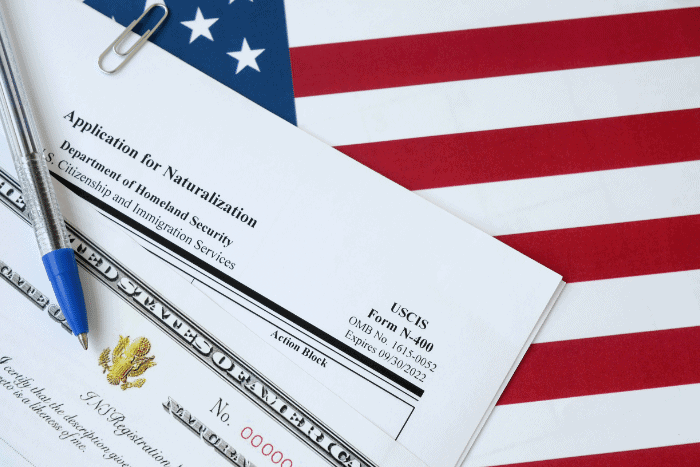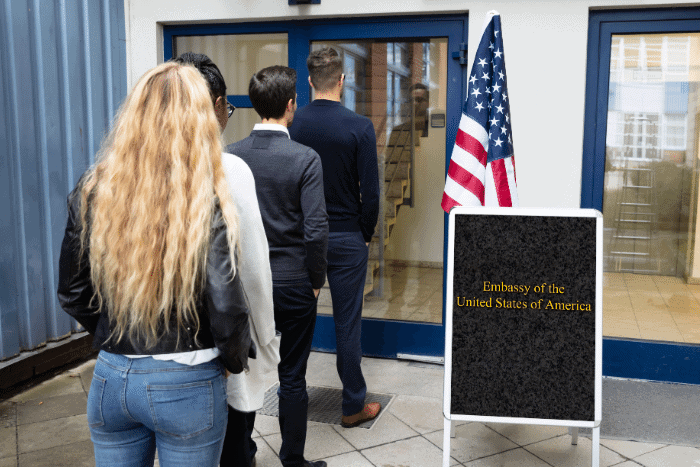Dateline: Kuala Lumpur, Malaysia
Our YouTube videos and articles generate a lot of questions about US citizenship renunciation. What is the process? What does it entail? How does it change your lifestyle? Where do you have to be to renounce?
We’ve already covered many different aspects of the renunciation process in other articles on our website. Below are some of our top articles on renouncing US citizenship.
But if this list doesn’t include the answers to your questions about US citizenship renunciation, then read on! In this article, we’ll cover some of the most frequently asked questions about renouncing US citizenship so that you have the answers you need to help you determine whether renouncing is right for you.
As someone who has gone through the process and renounced my US citizenship, it isn’t something that I recommend to everyone. It isn’t something that should be done to angrily spite the government. The renunciation process is for people with legitimate reasons for how it will help them to build out their offshore lifestyle and go where they are treated best.
My goal with this article is to give you real-world, practical information as someone who has renounced and is currently living a post-US citizenship lifestyle. Not theory, but applicable knowledge.
[embedded content]Do I Lose My Citizenship if I get Permanent Residence in Canada?
This is a very common question we get. It’s not directly about renunciation, but it highlights some important concepts that you need to consider when building out a strategy to become a global citizen.
If you’re a US citizen (or a citizen of most other countries) you are allowed to get temporary or permanent residence somewhere else. You are allowed to come and go from your home country as you please without worrying about someone taking away your citizenship.
Renunciation isn’t something you’re going to do by accident, it’s an act that you must perform on purpose.
You can get citizenship in another country with the intent of relinquishing US citizenship, which could give you the opportunity in some situations to take jobs in foreign governments. However, for the average person planning on going out and getting a second residence or even citizenship in another country, you won’t be required to give up your US citizenship.
Having a second residence or citizenship is perfectly fine.
There are other countries besides the US where you would need to report your permanent residence or dual citizenship. There are other countries like China, for example, where having dual citizenship isn’t allowed.
But from a US perspective, you don’t have to worry. I worked with someone who lived overseas for 19 years without ever coming back to the US. He had no problem moving back to the US recently.
Can You Get Your Citizenship Back?

The simple answer to this one is no. US citizenship renunciation is a final act.
Unlike other countries, the US doesn’t have a citizenship by descent process that allows you to claim citizenship through parents or grandparents. There is also no procedure to reinstate your citizenship.
We’ve worked with someone before who renounced their Australian citizenship but later had it reinstated. Australia has certain provisions that make this possible.
In the US, it’s permanent. If you decide you want your citizenship back later, you have to get in line with everyone else. You’ll have to find some way to get into the country, get a green card, wait out the naturalization time, apply, pay the fees, etc.
The difference if you go through naturalization after renouncing is that if you did anything wrong, the government could denaturalize you.
The question that keeps me up at night, however, is how would they handle you running for president if you renounced and then became a naturalized citizen. Technically, you could claim that you were a natural-born citizen.
But, that question aside, if you’re a natural-born citizen of the US and you renounce, you will never get that status back.
After I Become a Citizen of Another Country, Can I Still Travel to the US?

After you renounce, the US will treat you as a citizen of another country, with all the same travel opportunities. This means that there are going to be a couple of different ways to go back to the United States.
If you’re Canadian, you don’t really need to do much. The land border has created a special relationship between the two countries that translates into Canadians being able to enter the US without doing more than just showing up at the border. Canadians can stay for 180 days without a problem.
Outside of Canada, there are around 40 countries that have a visa waiver program. If you have citizenship in the UK, Australia, most of the EU, New Zealand, or one of the other countries on the list, you can fill out an ESTA form online and stay in the US for 90 days without worrying about a visa.
If you lose track of the days, don’t worry, they’ll send you an email at 80 days reminding you that it’s time to pack your stuff and leave.
But if your country belongs to this program, you can go to the US for 90 days at a time without much hassle. I haven’t heard of many people having problems with the visa waiver program.
If you are from a country that isn’t a part of this program, you’ll need to get a visa. Usually, if you’re just wanting to travel, you’re going to be looking at getting a B1 or B2 tourist visa for 180 days. If you want to start a business in the US or you already have a business that is physically in the US, there are other options.
What you want to keep in mind is that it would be an awful shame to renounce your citizenship just to get sucked back into the US tax net and end up paying taxes on your worldwide income.
Whether that was your reason for leaving in the first place or if it was just a fringe benefit to renouncing, it isn’t a situation you want to get caught in.
But back to whether or not you can travel, it’s important to know that there is no real guarantee. The only way that you will absolutely guarantee entrance to a country is if you’re a citizen.
I never worry about going to Colombia because I stay within the laws and never overstay. I have a residence permit in other countries, but I know that a country doesn’t have to let in permanent residents if they decide against it.
Citizenship is the one way that ensures that a country will have to let you in, no matter what.
If you were to show up at the US border without your passport as an American citizen, it might take them a while to process you, but they will eventually have to let you in.
Do I Have to be Outside the US to Renounce?
Yes. I mean, how would they get rid of you otherwise? You cannot renounce within the United States. You have to go to an embassy or consular post in a foreign country.
The closest you could probably get is probably Tijuana or Vancounver, but you do need to be outside of the US to renounce your citizenship.
Can You Renounce Your Only Citizenship?

In the case of the US, you can. However, your experience in attempting to become stateless is going to vary depending on where you go through the process.
Every embassy functions a little bit differently. Some embassies process more renunciations than others. There was a big brouhaha a number of years ago about how the wait to get an appointment in Canada was over a year in some of the consular posts, while others had lines less than a week.
Some embassies have done hundreds, others haven’t done one in years. Depending on where you go, you’re going to run into different interpretations of what they will and won’t do.
It’s really like any other situation in life. When you go to get on the plane for your flight, the gate agent is the one who has total control. It doesn’t matter if your bag is within the terms and conditions of the airline, if the gate agent doesn’t like it, you can’t take it on the plane.
I believe I’ve heard some stories of certain embassies where they don’t want to process renunciation for someone who could become stateless. However, it can be done and there are people who have.
Not every country allows you to become stateless. And even if you could become stateless, the interesting question is then what would eventually happen to you if you didn’t have residential status anywhere.
If I Give Up My US Citizenship, Am I Going to Give Up My Social Security Income?
Social security? No. Other government benefits? Yes.
As an example, Medicare is only for US residents. I’m not a Medicare expert, but generally if you’re living overseas, you won’t qualify. However, citizens overseas could always go back and requalify. I’m not as familiar with other government benefits like disability income; that isn’t an area that I’m particularly focused on.
But the basic idea is that if you paid into it, you can get it.
There are certain countries where the US won’t send social security income. In theory, you could have a US bank account and collect it if you were living in one of these restricted countries, but it is something you’d need to plan for.
Social security will be there when you retire.
If you want more information about how and why you can obtain Social Security benefits after US citizenship renunciation, we’ve covered all the details in this article.
Will a Criminal Record be a Hindrance to Renouncing?

No, but renouncing your citizenship will not get rid of your criminal record. You can’t give up your US citizenship to avoid being prosecuted for a crime or to avoid a civil lawsuit either. You’re still going to have that record.
The interesting thing about the US is that there aren’t many distinctions between citizens and non-citizens besides the ability to live in the country. As a non-citizen you can own property, open a bank account, and do many of the other things that a citizen can.
Now, banks may be more skittish to deal with non-citizens who have no connection to the country. If they do work with you, they may not want to give you as favorable mortgage terms because they don’t know where to track you down for a payment.
You’ll be in that same situation if you renounce.
There have been a couple of clickbait kind of stories where someone’s renunciation has been refused. They can refuse you for a technical error, that’s true. However, they won’t refuse your renunciation because of a criminal record.
The problem is that after you renounce, that criminal record is going to follow you and make it harder for you to travel, get resident status, and obtain other citizenships in the future. You’ll want to take that into account when you’re creating your plan.
The other complication is that there are situations where you may not be able to get a passport if you have certain obligations. Child support and back taxes for example. There may be situations where, if you’re on parole or something like that, you can’t get a passport.
If you don’t have a passport, you can’t leave the country. If you can’t leave, you can’t renounce.
Logistic restrictions aside, from the perspective of the State Department and the actual renunciation procedure, there are no restrictions.
Just know that it won’t clear the slate, any military obligations, debts, or anything else. If, ten years down the line after renouncing you go to a place where you need to get an FBI report, they’ll get you an FBI report. You still have that criminal record.
If I Live Overseas, Can I Change My Residence Permit from a US Citizen to a New Citizenship?
This is actually a situation we deal with quite a bit.
We have clients who have been living in the United States and want to move overseas. Some want to move so that they can renounce, but most aren’t.
We also have clients who already live overseas and have a residence permit in Hong Kong, Singapore, or one of the Asian countries where it’s typically more difficult to get citizenship. They’re US citizens, but want to change the citizenship on that permanent residence to another citizenship.
What we’ve found is that in the cases of some of these more difficult Asian countries, it is entirely possible to make the switch. There’s some footwork that needs to be done and a proper order to the process, but it’s doable.We’ve been able to help at least a couple of our clients do it.
There are other countries, often in Latin America, where that just isn’t possible.
For example, I had a residence permit in Mexico. I wanted to use another citizenship besides my US citizenship, but my attorney convinced me it would be easier and that I would be able to switch it later.
It was possible to make the switch in the case of Mexico, but there was a much more involved process that demanded more of my time in the country to switch citizenships. It would have been simpler to just apply for a new residence permit.
What happened in the end was that I never made the switch. When I later renounced my US citizenship, I was no longer able to enter the country as the nationality printed on the ID card. Any subsequent entry into Mexico would cancel my residence status and I would have to go do it all over again.
All in all, there are cases where yes, it is possible to switch citizenship, but it’s tricky to pull off. There are other countries where it’s simply not possible to do.
So, if you’re working towards a second citizenship in a country that doesn’t allow you to switch, you will obviously want to finish getting that citizenship before you renounce your original citizenship.
If you’re working towards multiple second citizenships, you definitely want to create your strategy in advance. How are you going to go about acquiring these residence permits? How is your new global lifestyle going to be balanced?
There’s a lot of delicate details that you need to plan for and handle when they come up. If you want help designing a holistic offshore strategy to avoid some of these trickier situations, feel free to reach out to our team for help.
Source: https://nomadcapitalist.com/2020/04/06/faqs-us-citizenship-renunciation/
